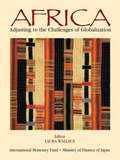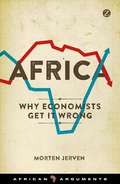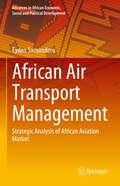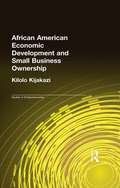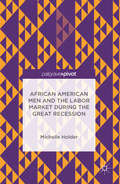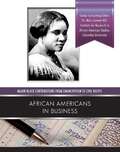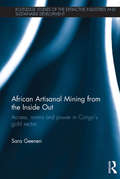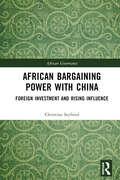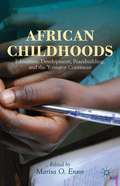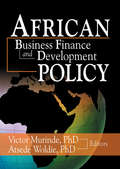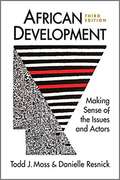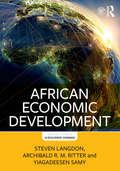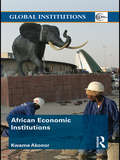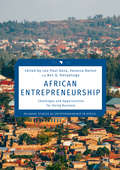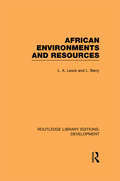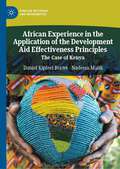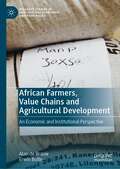- Table View
- List View
Africa: Why Economists Get It Wrong (African Arguments)
by Morten JervenNot so long ago, Africa was being described as the 'Hopeless Continent'. Recently, though, talk has turned to 'Africa Rising', with enthusiastic voices exclaiming the potential for economic growth across many of its countries. What, then, is the truth behind Africa's growth, or lack of it? In Is Africa Rising?, Morten Jerven fundamentally reframes the debate, challenging mainstream accounts of African economic history. Whilst for the past two decades experts have focused on explaining why there has been a 'chronic failure of growth' in Africa, Jerven shows that most African economies have been growing at a rapid pace since the mid-90s. In addition, African economies grew rapidly in the 50s, the 1960s, and even into the 1970s. Thus, African states were dismissed as incapable of development based largely on observations made during the 1980s and early 1990s. The result has been misguided analysis, and few practical lessons learned. An essential account of the real impact economic growth has had on Africa, and what it means for the continent's future.
African Air Transport Management: Strategic Analysis of African Aviation Market (Advances in African Economic, Social and Political Development)
by Eyden SamunderuThis book provides a comprehensive overview of the African air transport market from a strategic management perspective. Drawing on well-grounded theories, research applications and real-world case studies, it examines competition dynamics, interconnectivity, the growth of low-cost carriers, and demand patterns in air transport for both passenger and cargo traffic. It also presents an expert analysis on the introduction of the Single African Air Transport Market (SAATM), made possible by the liberalization of the air transport market, from a regulatory perspective. Based on the results of the analysis, the book evaluates both the benefits and limitations of an open skies agreement. Furthermore, it shed lights on the challenges and complexities of African public infrastructure investments and airport financing, discusses the impact of COVID-19, and provides strategic recommendations for airlines. The book is aimed at professionals in aviation and airline industries and students interested in the African air transport market.
African American Economic Development and Small Business Ownership (Garland Studies in Entrepreneurship)
by Kilolo KijakaziFirst Published in 1997. Routledge is an imprint of Taylor & Francis, an informa company.
African American Inequality in the United States
by Janice H. Hammond A. Kamau Massey Mayra GarzaThis note describes how historical and on-going policies and practices that discriminate against African Americans led to present-day inequality. Topics include slavery, segregation, Jim Crow laws, "black codes," and policies and practices relating to criminal justice, housing, and education.
African American Men and the Labor Market during the Great Recession
by Michelle HolderThis book analyzes the status and position of African American men in the U.S. labor market prior to, during, and after the Great Recession. Using a model of occupational crowding, the book outlines how the representation of African American men in major occupational categories almost universally declined during the recent recession even as white non-Hispanic men were able to maintain their occupational representation in the face of staggering job losses. Using US Census Bureau data, this book illustrates how African American men sought to insulate their group from devastating job losses by increasing their educational attainment in a job market where employers exercised more leverage in hiring. However, this strategy was unable to protect this group from disparate job losses as African American men became further marginalized in the workforce during the Great Recession. Policy approaches to address high African American male unemployment are outlined in the final chapter.
African Americans and the Mississippi River: Race, History, and the Environment (Routledge Environmental Humanities)
by Dorothy Zeisler-VralstedThis book follows the historical trajectory of African Americans and their relationship with the Mississippi River dating back to the 1700s and ending with Hurricane Katrina and the still-contested Delta landscape. Long touted in literary and historical works, the Mississippi River remains an iconic presence in the American landscape. Whether referred to as "Old Man River" or the "Big Muddy," the Mississippi River represents imageries ranging from the pastoral and Acadian to turbulent and unpredictable. However, these imageries—revealed through the cultural production of artists, writers, poets, musicians, and even filmmakers—did not reflect the experiences of everyone living and working along the river. Missing is a broader discourse of the African American community and the Mississippi River. Through the experiences of African Americans with the Mississippi River, which included narratives of labor (free and enslaved), refuge, floods, and migration, a different history of the river and its environs emerges. The book brings multiple perspectives together to explore this rich history of the Mississippi River through the intersection of race and class with the environment. The text will be of great interest to students and researchers in environmental humanities, including environmental justice studies, ethnic studies, and US and African American history.
African Americans in Business (Major Black Contributions from Emancipat)
by Tish DavidsonMany people dream of owning their own business or making it to the top of the corporate ladder. In the pages of this book, you'll meet African Americans who overcame obstacles and stereotypes to make their dreams a reality. Madam C. J. Walker was orphaned at age 7, married at 14, became a mother at 18, and was widowed at 20. She went on make a million dollars selling hair care products. Berry Gordy loved music but went broke after opening a record store. He didn't give up, though. Gordy eventually started Motown Records, which became one of the country's most successful record labels and introduced a host of talented black artists to mainstream American audiences. Stanley O'Neal grew up on a farm without running water or indoor toilets. Through intelligence and hard work he became the head of a $50 billion investment bank. Read about these and other inspiring figures in this book.
African Artisanal Mining from the Inside Out: Access, norms and power in Congo’s gold sector (Routledge Studies of the Extractive Industries and Sustainable Development)
by Sara GeenenArtisanal mining is commonly associated with violent conflict, rampant corruption and desperate poverty. Yet millions of people across Sub Sahara Africa depend on it. Many of them are living in eastern Democratic Republic of Congo (DRC), home to important mineral reserves, but also to a plethora of armed groups and massive human rights violations. African Artisanal Mining from the Inside Out provides a rich and in-depth analysis of the Congolese gold sector. Instead of portraying miners and traders as passive victims of economic forces, regional conflicts or disheartening national policies, it focuses on how they gain access to and benefit from gold. It shows a professional artisanal mining sector governed by a set of specific norms, offering ample opportunities for flexible employment and local livelihood support and being well-connected to the local economy and society. It argues for the viability of artisanal gold mining in the context of weak African states and in the transition towards a post-conflict and more industrialized economy. This book will be of great interest to researchers and postgraduates studying natural resources and development as well as those in development studies, African studies, sociology, political economy, political ecology, legal pluralism, and history.
African Bank Investments Limited (A)
by Lynn Sharp Paine Will HurwitzLess than a year after joining the board of African Bank Investments Limited (ABIL), the newest director finds himself in difficult discussions with other directors about removing the struggling company's CEO. The case is set in South Africa in mid-2014 as shares in ABIL, which traded on the Johannesburg Stock Exchange, are declining precipitously. The case describes ABIL's origins and evolution, including the acquisition and growth of its wholly owned subsidiary African Bank, a provider of unsecured loans to help individuals pay for expenses such as vehicle repairs, home renovations, funeral costs, medical bills, and education. As ABIL's profits rose and share price soared, it became the darling of analysts. However, when the South African economy turned sour, customers started defaulting on their loans, and ABIL and African Bank began to struggle. As ABIL's stock price dropped, the management team faced difficult questions about the company's lending practices, risk management processes, and plans to turn the business around. By 2014, the situation was grim, and pressure mounted from shareholders and market regulators for the board to take action. The case details the history of unsecured lending in South Africa, describes the regulatory, social, and legal contexts for the company and its business model, and explores the company's unique corporate structure and executive and director dynamics.
African Bank Investments Limited (B)
by Lynn Sharp Paine Will HurwitzLess than a year after joining the board of African Bank Investments Limited (ABIL), the newest director finds himself in difficult discussions with other directors about removing the struggling company's CEO. The case is set in South Africa in mid-2014 as shares in ABIL, which traded on the Johannesburg Stock Exchange, are declining precipitously. The case describes ABIL's origins and evolution, including the acquisition and growth of its wholly owned subsidiary African Bank, a provider of unsecured loans to help individuals pay for expenses such as vehicle repairs, home renovations, funeral costs, medical bills, and education. As ABIL's profits rose and share price soared, it became the darling of analysts. However, when the South African economy turned sour, customers started defaulting on their loans, and ABIL and African Bank began to struggle. As ABIL's stock price dropped, the management team faced difficult questions about the company's lending practices, risk management processes, and plans to turn the business around. By 2014, the situation was grim, and pressure mounted from shareholders and market regulators for the board to take action. The case details the history of unsecured lending in South Africa, describes the regulatory, social, and legal contexts for the company and its business model, and explores the company's unique corporate structure and executive and director dynamics.
African Bargaining Power with China: Foreign Investment and Rising Influence (African Governance)
by Christina SeyfriedThis book provides a detailed account of the political economy around investment deal negotiations between African governments and private Chinese investors. The book draws on evidence from experiments and hundreds of interviews with policy makers and Chinese investors across Nigeria, South Africa, Kenya, Ethiopia and Tanzania. It shows that governments of authoritarian or one-party dominant states, which are among the top-receivers of Chinese investments, are able to easily and successfully act collectively to impose human capital and technology transfer requirements. The book argues that, rather than treating African countries as "price-takers" in the face of increasing Chinese influence in the continent, we should instead recognise the significant bargaining leverage that many African governments have to influence deal conditions, especially with smaller private Chinese companies. It demonstrates that several African governments can instead act "as price-setters" and that the success of the rising Chinese presence in Africa, and whether this leads to positive or negative development outcomes, fundamentally depends on the development strategies that individual African governments decide on. In the context of an often-polarised debate, the original research presented in this book has important implications for the future economic development strategies of African countries. As such, it will be of interest to researchers working on Chinese and African investment, politics, institutions, business, economics, and international relations.
African Childhoods
by Marisa O. EnsorWith 70 per cent of its people under the age of 30, Africa is the world's youngest continent. African youngsters have been largely characterized as either vulnerable victims of the frequent humanitarian crises that plague their homelands, or as violent militarized youth and 'troubled' gang members. Young people's contributions to processes of educational provision, peace building and participatory human development in Africa are often ignored. While acknowledging the profound challenges associated with growing up in an environment of uncertainty and deprivation, African Childhoods sheds light on African children's often constructive engagement with a variety of societal conditions, adverse or otherwise, and their ability to positively influence their own lives and those of others.
African Communications Group
by Anita M. Mcgahan Dale O. CoxeDescribes the opportunities that confront the African Communications Group, an entrepreneurial organization that plans to introduce a wireless pay-phone system in Tanzania. Provides a foundation for the analysis of value creation and of value capture. The possibility of entry by other companies, the presence of a large supplier, and uncertainties about demand all create important tradeoffs for the new venture.
African Department: Expenditure Composition and Economic Development in Benin
by Marco Pani Mohamed El HarrakThis paper estimates how changes in the composition of public expenditure affect growth, employment, and income inequality in Benin. These estimates are based on a model of labor market segmentation with partial labor mobility along the lines of Harris and Todaro (1970). The model is calibrated to fit the data for the Beninese economy over the period 2003-07. Despite some data limitation, the results obtained suggest that a shift in the composition of expenditure from wages to public investment would have beneficial effects on growth, employment, and income equality, particularly through its effects on wages and labor demand in the private formal sector; conversely, an increase in civil servants' wages, even if it were financed by grants, could result in lower growth, higher unemployment, and larger wage disparities across sectors.
African Department: Wage Policy and Fiscal Sustainability in Benin
by Charlotte LundgrenFinancial report from the IMF
African Development Finance and Business Finance Policy
by Atsede Woldie Victor MurindeFinancial plans that stimulate growth and eliminate poverty in developing African countries! African Developmental Finance and Business Finance Policy presents theoretical/conceptual and empirical articles that provide invaluable insights into successful business techniques and strategies for the African business arena-the last great frontier of international business expansion. Researchers and practitioners in the field of developmental finance discuss the design and implementation of financial policies for pro-poor growth and poverty alienation in developing countries, including Kenya, Zambia, Nigeria, Mauritius, and Zimbabwe. The book focuses on banking, business finance, and investment, detailing strategies for coping with a small financial system, bank licensing policies, correction action rules, quality of banking services, and the revitalization of the African stock exchange. African Developmental Finance and Business Finance Policy features papers presented on key policy issues addressed at the April 2001 international conference of the Institute for Developmental Policy and Management at the University of Manchester in England. Topics addressed include: financial regulation, interest rates bank ownership regulatory forbearance emerging stock markets determinants of capital structure financial reform and much more! Targeted to policymakers in government and international agencies, academics, consultants, and executives, African Developmental Finance and Business Finance Policy is an essential resource for advancing and communicating research on developmental policy in developing countries.
African Development: Making Sense Of The Issues And Actors
by Danielle Resnick Todd J. MossBoth authoritative and accessible, African Development introduces the issues, actors, and institutions at play in development trajectories across sub-Saharan Africa. This new edition, thoroughly updated, includes an entirely new chapter devoted to key demographic trends in the region, especially rapid urbanization and the distinct “youth bulge.” There is also a review of major democratic gains and disappointments since 2011; analysis of renewed internal armed conflicts; and attention to the contemporary sovereign debt crisis relative to the structural adjustment debt of earlier decades. The book uniquely brings to life the collective impact of history, economics, and politics on development in the region.
African Economic Development (Routledge Textbooks in Development Economics)
by Yiagadeesen Samy Steven Langdon Archibald R.M. RitterSub-Saharan Africa is at a turning point. The barriers to economic growth seen in the 1980-2000 era are disappearing and new optimism is spreading. However, difficult goals of eliminating poverty, achieving equity and overcoming environmental threats continue. This much-needed and insightful textbook has been written to help us understand this combination of emerging improvements and significant challenges. Opening with an analysis of the main theories relating to development in Sub-Saharan Africa, the book explores all the key issues, including: Human development; Rapid urbanization; Structural and gender dimensions; Sustainable development and environmental issues; and Africa’s role in the world economy. The authors use economic tools and concepts throughout, in a way that makes them accessible to students without an economics background. Readers are also aided by a wide range of case studies, on-the-ground examples and statistical information, which provide a detailed analysis of each topic. This text is also accompanied by a companion website, featuring additional sources for students and instructors. African Economic Development is a clear and comprehensive textbook suitable for courses on African economic development, development economics, African studies and development studies.
African Economic Institutions (Global Institutions)
by Kwame AkonorThis book analyzes how, and under what conditions, African International Economic Organizations (IEO) have evolved, and what individual and collective contributions, if any, these African IEOs have had on Africa’s socio-economic development. Providing a comprehensive and accessible overview, the book covers the continent’s main IEOs, The United Nations Economic Commission on Africa, The African Development Bank; and The New Partnership for Africa’s Development as well as the five major Regional Economic Communities, including Economic Community of West African States, and Southern African Development Community. Assessing the degree to which African IEO’s have been able to chart their own course in coming up with their development agendas and priorities rather than following the lead of Global Institutions, this book: Provides a descriptive and analytical overview of the historical and contemporary development blueprints produced for Africa Clearly examines the contribution made by African economic institutions towards development Considers whether African economic institutions are building blocks or stumbling blocks in Africa’s development Offers a detailed evaluation and critique of African IEOs Enabling the reader to reach a deeper understanding of the challenges and potentials of development on the African continent, African Economic Institutions will be of interest to all students and scholars of African politics and development studies.
African Economies and the Politics of Permanent Crisis, 1979-1999
by Nicolas Van De WalleThis 2001 book explains why African countries have remained mired in a disastrous economic crisis since the late 1970s. It shows that dynamics internal to African state structures largely explain this failure to overcome economic difficulties rather than external pressures on these same structures as is often argued. Far from being prevented from undertaking reforms by societal interest and pressure groups, clientelism within the state elite, ideological factors and low state capacity have resulted in some limited reform, but much prevarication and manipulation of the reform process, by governments which do not really believe that reform will be effective, which often oppose reforms because they would undercut the patronage and rent-seeking practices which undergird political authority, and which lack the administrative and technical capacity to implement much reform. Over time, state decay has increased.
African Entrepreneurship: Challenges And Opportunities For Doing Business (Palgrave Studies Of Entrepreneurship In Africa)
by Vanessa Ratten Leo-Paul Dana Ben Q. HonyenugaExplores the cultural and historical influences to highlight how business in Africa represents a unique challenge.<P><P> Discusses the regulatory framework that helps and hinders business in Africa.<P> Examines the different types of entrepreneurship emerging in Africa including the changing conditions for female and ethnic entrepreneurs.<P>This book outlines the unique challenges and opportunities of doing business in Africa, analysing how varying degrees of development across its countries affects entrepreneurship. Taking into account historical and cultural contexts, the authors approach the topic by evaluating the different possibilities of business opportunity in Africa. Insightful contributions explore an extensive range of African countries, discussing both formal and informal entrepreneurship, as well as the different factors that influence the growing economy of Africa. African Entrepreneurship will be of interest to anyone researching the potential of doing business in Africa, as well as entrepreneurs and policy-makers looking to expand their knowledge on how businesses are managed in this region.
African Environments and Resources (Routledge Library Editions: Development)
by L. A. Lewis L. BerryFirst published in 1988, this work provides a comprehensive picture of the range of physical environments in Africa, focusing upon those characteristics and issues central to the management of environmental resources. Beginning with an overview of the geographical and environmental history of Africa, the authors also provide to the evolution of the management of resources and then details a broadly defined ecosystem approach, in which major environmental resource issues are identified and addressed in the tropical rainforest, the Savannah dry-forest, the arid and semi-arid areas, the highlands, and the extra-tropical zones of Northern and Southern Africa. The book is designed to contribute to a better understanding of African environmental and resource-management problems and this reissue should be welcomed by students of Africa and of environmental resource management problems in general.
African Experience in the Application of the Development Aid Effectiveness Principles: The Case of Kenya (African Histories and Modernities)
by Nadeem Malik Daniel Kipleel BorterThis book analyses the diffusion and implementation of Aid Effectiveness Principles in Kenya’s agricultural sector. Although Aid Effectiveness Principles represent a significant step in aid and development discourse, studies on its implementation remain inadequate, especially in the African context. This book combines the perspectives of the Kenyan government, donor representatives and small-scale farmers. The discussion on Kenya brings in comparative perspectives and, therefore, would have broader relevance to the African region, in general. It highlights a disconnect between the government and farmers concerning the ownership concept, where farmers lack a voice in important policy matters. The book shows that donors have exploited the weaknesses in government responses to interpret The Principles in ways that suit their strategic interests. Consequently, the book argues that the diffusion of Aid Effectiveness Principles has taken the form of symbolic imitation – a form of policy diffusion where the policymakers choose policies for their symbolic value rather than their effectiveness.
African Farmers, Value Chains and Agricultural Development: An Economic and Institutional Perspective (Palgrave Studies in Agricultural Economics and Food Policy)
by Erwin Bulte Alan de BrauwThis book provides a thorough introduction to and examination of agricultural value chains in Sub-Saharan Africa. First, the authors introduce the economic theory of agri-food value chains and value chain governance, focusing on domestic and regional trade in (and consumption of) food crops in a low-income country context. In addition to mainstream and heterodox thinking about value chain development, the book pays attention to political economy considerations. The book also reviews the empirical evidence on value chain development and performance in Africa. It adopts multiple lenses to examine agricultural value chains, zooming out from the micro level (e.g., relational contracting in a context of market imperfections) to the meso level (e.g., distributional implications of various value chain interventions, inclusion of specific social groups) and the macro level (underlying income, population and urbanization trends, volumes and prices, etc.).Furthermore, this book places value chain development in the context of a process the authors refer to as structural transformation 2.0, which refers to a process where production factors (labor, land and capital) move from low-productivity agriculture to high-productivity agriculture. Finally, throughout the book the authors interpret the evidence in light of three important debates: (i) how competitive are rural factor and product markets, and what does this imply for distribution and innovation? (ii) what role do foreign investment and factor proportions play in the development of agri-food value chains in Africa? (iii) what complementary government policies can help facilitate a process of agricultural value chain transformation, towards high-productive activities and enhancing the capacity of value chains to generate employment opportunities and food security for a growing population.
